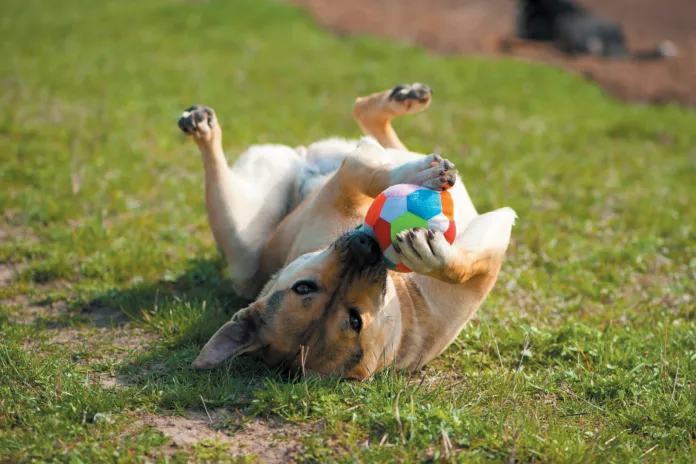If you have a Labrador retriever you can skip this article. There is nothing a Lab won’t do for a morsel of food. That’s true for a lot of dogs, actually. But there is a sizable subset of canines who are not motivated to learn a specific trick or behavior simply because they will receive a food treat if they get it right. How do you teach such a dog?
It takes a little ingenuity because the prize has to come immediately after a dog gets it right in order for him to understand that he is being rewarded for following through on a cue. Food is easy to give right away, but if he has to wait even 10 or 15 seconds for you to walk over to get the reward, he will think that every time he does what you ask, the result is that you start walking. He will not understand that the end result is the prize. But it can be done.
Non-food rewards
Toys. For a dog unmotivated by food, a toy might do the trick in certain situations. Let’s say you want to teach a dog the “Sit!” cue. You can lure your pet into a sitting position with a squeaky toy. Start by holding the toy in front of your dog’s face and then slowly draw it upward, in an arc, over the top of his face and head. His eyes and snout will automatically go upward and, as they do, his rump will make its way to the ground. Ta da! He’s sitting, and you can reward him right away by squeaking the toy and tossing it for him to catch or retrieve. Have several squeaky toys at your side to tempt him back to you should his attention wander.
To teach a dog disinterested in food treats to follow through on the “Come!” cue, perhaps a tennis ball will do the trick. When he heeds your call to come or even happens to come over to you, throw the ball for him to chase. All of a sudden, coming when you call becomes a lot of fun. Have several balls on hand in case he doesn’t bring the ball back to you but you still want the learning session to go on for a few minutes.
Gestures of affection. For some dogs, a soothing scratch under the chin might be reward enough for responding to a cue. Or maybe gentle stroking right behind the ears is what will reinforce a behavior you want your pet to learn to do when you ask. Think about what form of physical affection your pet especially enjoys and then try applying it at those times that you want to elicit a particular response, showing your dog how pleased you are that he has complied.
Thinking outside the box. Perhaps your dog loves playing chase, or tug of war. You can engage in either of those games immediately following his success in responding to your cue. Another reward can be more freedom. For instance, if you want to teach your dog not to tug on the leash, take him to a park where dogs are allowed off leash but keep his lead attached while walking until he stops tugging. Once he does, you can let him loose; you will have reinforced the lesson that when he doesn’t tug, something he really wants happens.
There’s no one thing that will work for all dogs who are not interested in food rewards. But if you think about the things your dog particularly loves — toys, games, gestures of affection, soothing or enthusiastic praise from you — you will be able to teach him to attend to your cues.
Your pet may very well be willing to learn in exchange for food. Maybe:
You’re not using good enough treats. To get your pet to respond to your cues, especially to ones he finds challenging, the food rewards may need to be really delicious and special — tiny bits of baked chicken, for instance, or liver, or other food he doesn’t usually get.
He’s bored with the treat you keep giving. Even chicken or liver can get tedious after a while. Try mixing it up. Other rewards that may elicit the behavior you seek include steak, cheese, peanut butter…. The list is pretty extensive.
He’s not hungry enough. Don’t train with food after your dog has just been fed. A food reward will be less motivating right then. You don’t want your dog starving when you’re trying to teach him a cue, but he should not be full, either. A little hungry might be just right.
He’s feeling especially stressed. Emotional stress cuts appetite. It’s biological. The gastric juices that digest food take a back seat to the hormones released in fight-or-flight mode. Are you trying to train your dog in a crowded park? When there’s tension in the house? Try training and using food rewards when things are stable and happy.
Something’s wrong medically. If your dog normally enjoys food but has lost interest — either during training or for regular meals — he could have a physical ailment. Take him to the veterinarian to see if he has a medical condition that requires treatment.





